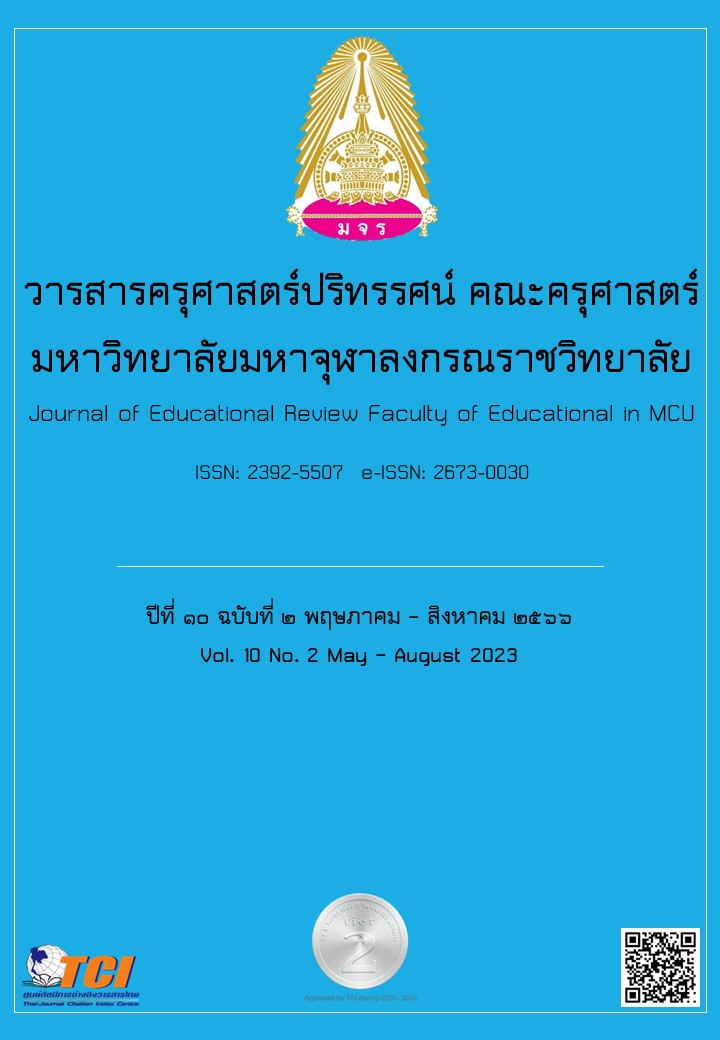THE DIGITAL LEADERSHIP DEVELOPMENT ACCORDING TO BUDDHIST PRINCIPLES OF SCHOOL ADMINISTRATORS
Main Article Content
Abstract
The purposes of this research article was to present the digital leadership development according to Buddhist principles of school administrators. Using mixed method research, including qualitative research by in-depth interviews with 14 key informants and quantitative research from 2 groups of samples, the first sample group was 326 school administrators and teachers under the Chonburi Primary Educational Service Area Office. The second sample group was 149 school administrators under the Chonburi Primary Educational Service Area Office. Statistics used to analyze the data, mean, percentage and standard deviation. The results of the research were as follows: The digital leadership development according to Buddhist principles of school administrators consists of 1) Digital Leadership Development Principles 2) Digital Leadership Development Objectives 3) Components of Digital Leadership 4) Digital Leadership Development Methodology 5) Digital Leadership Development Stages 6) Dhamma principles to develop the digital leadership: four foundations for accomplishment and 7) Success Factors in Digital Leadership Development according to Buddhist principles of school administrators. The overall of the digital leadership development according to Buddhist Principles of School Administrators is in the high level with the aspect arranged from the most to the least: utility, accuracy, propriety and feasibility at the high level respectively.
Article Details

This work is licensed under a Creative Commons Attribution-NonCommercial-NoDerivatives 4.0 International License.
ทัศนะและความคิดเห็นที่ปรากฏในบทความในวารสารฉบับนี้ถือเป็นความรับผิดชอบของผู้เขียนบทความนั้นเพียงผู้เดียว และไม่ถือเป็นทัศนะและความรับผิดชอบของกองบรรณาธิการ
กองบรรณาธิการขอสงวนสิทธิ์ในการคัดเลือกบทความลงตีพิมพ์และจะแจ้งให้เจ้าของบทความทราบหลังจากผู้ประเมินบทความตรวจอ่านบทความแล้ว
ต้นฉบับที่ได้รับการตีพิมพ์ในวารสารครุศาสตร์ปริทรรศน์ คณะครุศาสตร์ มหาวิทยาลัยมหาจุฬาลงกรณราชวิทยาลัย ถือเป็นกรรมสิทธิ์ของคณะครุศาสตร์ มหาวิทยาลัยมหาจุฬาลงกรณราชวิทยาลัย ห้ามนำข้อความทั้งหมดหรือบางส่วนไปพิมพ์ซ้ำ เว้นเสียแต่ว่าจะได้รับอนุญาตจากมหาวิทยาลัยฯ เป็นลายลักษณ์อักษร
References
ธานินทร์ ศิลป์จารุ. (2552). การวิจัยและวิเคราะห์ข้อมูลทางสถิติ. กรุงเทพมหานคร: บิซิเนสอาร์แอนด์ดี.
นงลักษณ์ เรือนทอง. (2550). รูปแบบการบริหารโรงเรียนที่มีประสิทธิผล. ดุษฎีนิพนธ์ปรัชญาดุษฎีบัณฑิต.มหาวิทยาลัยศิลปากร.
บุญชุม ศรีสะอาด. (2535). วิจัยเบื้องต้น. กรุงเทพมหานคร: สุวีริยาสาส์นการพิมพ์.
พระพรหมคุณาภรณ์ (ป. อ. ปยุตฺโต). (2554). พจนานุกรมพุทธศาสน์ ฉบับประมวลศัพท์. กรุงเทพมหานคร: โรงพิมพ์พระพุทธศาสนาของธรรมสภา.
วรรณลัดดา ถิ่นกลาง. (2556). การเป็นผู้นำทางวิชาการการบริหารจัดการทางการศึกษา. รายงานการวิจัย. มหาวิทยาลัยราชภัฏนครราชสีมา.
วีณา เอื้อศิรินุเคราะห์ และคณะ. (2554). ทิศทางในการพัฒนาทักษะทางการบริหารของผู้บริหารมหาวิทยาลัยมหิดล. นครปฐม: มหาวิทยาลัยมหิดล.
สำนักงานคณะกรรมการดิจิทัลเพื่อเศรษฐกิจและสังคมแห่งชาติ. (2561). แผนปฏิบัติการด้านดิจิทัลเพื่อเศรษฐกิจและสังคมระยะ 5 ปี (พ.ศ. 2561-2565) ภายใต้นโยบายและแผนระดับชาติว่าด้วย การพัฒนาดิจิทัลเพื่อเศรษฐกิจและสังคม (พ.ศ. 2561-2580). กรุงเทพมหานคร: กระทรวงดิจิทัลเพื่อเศรษฐกิจและสังคม.
สุกัญญา แช่มช้อย. (2561). การบริหารสถานศึกษาในยุคดิจิทัล. กรุงเทพมหานคร: โรงพิมพ์แห่งจุฬาลงกรณ์มหาวิทยาลัย.
สุภางค์ จันทวานิช. (2552). การวิเคราะห์ข้อมูลในการวิจัยเชิงคุณภาพ. พิมพ์ครั้งที่ 9. กรุงเทพมหานคร: โรงพิมพ์แห่งจุฬาลงกรณ์มหาวิทยาลัย.
สุรัชนี เคนสุโพธิ์. (2560). การฝึกอบรมและพัฒนาทรัพยากรมนุษย์. อุดรธานี: มหาวิทยาลัยราชภัฏอุดรธานี.
เอกชัย กี่สุขพันธ์. (2559). การบริหารสถานศึกษายุคดิจิทัล (School Management in Digital Era). แหล่งที่มา https://www.trueplookpanya.com/knowledge/content/52232/-edu-t2s1-t2-t2s3- สืบค้นเมื่อ 2 มิ.ย. 2564.
Dessler. (2004). Seven Steps to Effective Instructional Leadership. California: Carwin Press.
Kouzes & Posner. (1997). The Leadership Challenge. San Francisco: Jossey-Bass.
McCauley & Velser. (1988). Effective Leadership. 4rd ed. Toronto: Nelson Education.
Sheninger, E. (2014). Digital Leadership: Changing Paradigms for Changing Times. Thousand Oaks, CA: Corwin Press.


